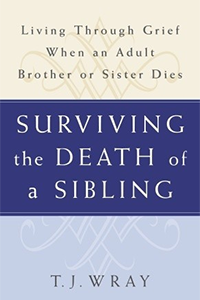Surviving the Death of a Sibling
Author: Beth Anderson
Living Through Grief When an Adult Brother or Sister Dies
“We brothers and sisters were so happy at home…Who could have then believed that life would ever become so torn asunder?” Dag Hammerskjold
That is one of many quotes from Surviving the Death of a Sibling: Living Through Grief When an Adult Brother or Sister Dies by T. J. Wray. This book saved me in those first weeks after my little brother, Sergeant Phillip Anderson, was killed in Balad Ruz, Iraq. While reading the book, I was amazed at how the author’s feelings following the death of her brother mirrored my own. The death of a sibling is one of life's greatest and often unrecognized losses.
Although nothing can take away the sorrow and the sense of unfairness that we feel when our brother or sister dies, T.J. Wray's words help to convey the sense that we are not alone in our grief journey. As we also learn through TAPS, comfort comes from knowing that, as surviving siblings, we are forever connected. I was reassured by reading the experiences of other surviving siblings whose stories are so beautifully compiled in this book.
Dr. Wray writes, “Although the subjects of death, dying, and grief are more widely discussed now than in years past, the subject of adult sibling grief has been largely ignored by the grief support community, leaving surviving adult siblings to endure their grief in silence…Our society fails to recognize the depth of love we feel for our brothers and sisters and the consequent grief felt at their passing. Aside from our parents, our siblings are the only people who have known us for our entire life. Adult sibling bereavement is what psychologists call a disenfranchised loss, which means that society fails to classify our mourning as a legitimate loss. After all, when an adult sibling dies, he or she often leaves behind parents, a spouse, and even children—all of whom suffer a more socially recognized type of loss—while surviving adult siblings stand in the shadows, often feeling as if our grief is somehow unwarranted.”
Each chapter ends with a “What Helps” section containing many practical suggestions for coping with grief. The suggestions are a great tool to share with a support person in your life, like a spouse, partner, or best friend. There is also an excellent resource list at the end of the book. In addition to recommending the book to other bereaved siblings, I also immediately asked my spouse to read it. It can definitely help a great deal to give our spouses or partners something that they can learn from and use as a resource. In most cases, they have no idea what we're going through and can definitely benefit from direction in how to handle the situation with the amount of compassion and sensitivity that is needed. When handing over the book, I said, "Everything written in this book is exactly what I'm feeling now and will be feeling for a long time. Please refer to it often."
By Beth Anderson, Book Written by T.J. Wray

